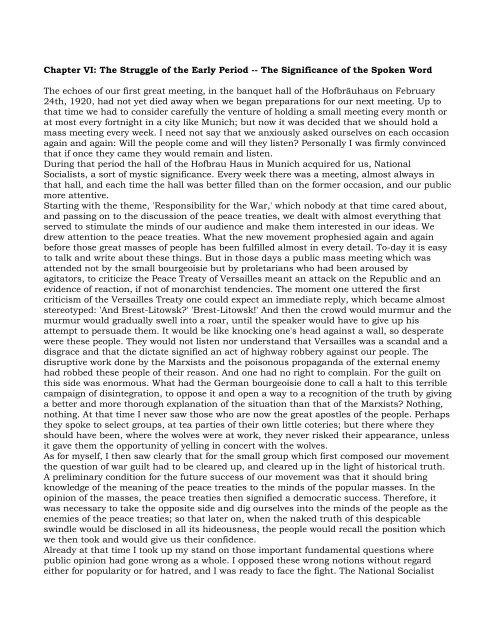Mein Kampf by Adolf Hitler
Mein Kampf by Adolf Hitler
Mein Kampf by Adolf Hitler
- TAGS
- kampf
- adolf
- hitler
- stuff2share.com
You also want an ePaper? Increase the reach of your titles
YUMPU automatically turns print PDFs into web optimized ePapers that Google loves.
Chapter VI: The Struggle of the Early Period -- The Significance of the Spoken Word<br />
The echoes of our first great meeting, in the banquet hall of the Hofbräuhaus on February<br />
24th, 1920, had not yet died away when we began preparations for our next meeting. Up to<br />
that time we had to consider carefully the venture of holding a small meeting every month or<br />
at most every fortnight in a city like Munich; but now it was decided that we should hold a<br />
mass meeting every week. I need not say that we anxiously asked ourselves on each occasion<br />
again and again: Will the people come and will they listen? Personally I was firmly convinced<br />
that if once they came they would remain and listen.<br />
During that period the hall of the Hofbrau Haus in Munich acquired for us, National<br />
Socialists, a sort of mystic significance. Every week there was a meeting, almost always in<br />
that hall, and each time the hall was better filled than on the former occasion, and our public<br />
more attentive.<br />
Starting with the theme, 'Responsibility for the War,' which nobody at that time cared about,<br />
and passing on to the discussion of the peace treaties, we dealt with almost everything that<br />
served to stimulate the minds of our audience and make them interested in our ideas. We<br />
drew attention to the peace treaties. What the new movement prophesied again and again<br />
before those great masses of people has been fulfilled almost in every detail. To-day it is easy<br />
to talk and write about these things. But in those days a public mass meeting which was<br />
attended not <strong>by</strong> the small bourgeoisie but <strong>by</strong> proletarians who had been aroused <strong>by</strong><br />
agitators, to criticize the Peace Treaty of Versailles meant an attack on the Republic and an<br />
evidence of reaction, if not of monarchist tendencies. The moment one uttered the first<br />
criticism of the Versailles Treaty one could expect an immediate reply, which became almost<br />
stereotyped: 'And Brest-Litowsk?' 'Brest-Litowsk!' And then the crowd would murmur and the<br />
murmur would gradually swell into a roar, until the speaker would have to give up his<br />
attempt to persuade them. It would be like knocking one's head against a wall, so desperate<br />
were these people. They would not listen nor understand that Versailles was a scandal and a<br />
disgrace and that the dictate signified an act of highway robbery against our people. The<br />
disruptive work done <strong>by</strong> the Marxists and the poisonous propaganda of the external enemy<br />
had robbed these people of their reason. And one had no right to complain. For the guilt on<br />
this side was enormous. What had the German bourgeoisie done to call a halt to this terrible<br />
campaign of disintegration, to oppose it and open a way to a recognition of the truth <strong>by</strong> giving<br />
a better and more thorough explanation of the situation than that of the Marxists? Nothing,<br />
nothing. At that time I never saw those who are now the great apostles of the people. Perhaps<br />
they spoke to select groups, at tea parties of their own little coteries; but there where they<br />
should have been, where the wolves were at work, they never risked their appearance, unless<br />
it gave them the opportunity of yelling in concert with the wolves.<br />
As for myself, I then saw clearly that for the small group which first composed our movement<br />
the question of war guilt had to be cleared up, and cleared up in the light of historical truth.<br />
A preliminary condition for the future success of our movement was that it should bring<br />
knowledge of the meaning of the peace treaties to the minds of the popular masses. In the<br />
opinion of the masses, the peace treaties then signified a democratic success. Therefore, it<br />
was necessary to take the opposite side and dig ourselves into the minds of the people as the<br />
enemies of the peace treaties; so that later on, when the naked truth of this despicable<br />
swindle would be disclosed in all its hideousness, the people would recall the position which<br />
we then took and would give us their confidence.<br />
Already at that time I took up my stand on those important fundamental questions where<br />
public opinion had gone wrong as a whole. I opposed these wrong notions without regard<br />
either for popularity or for hatred, and I was ready to face the fight. The National Socialist


